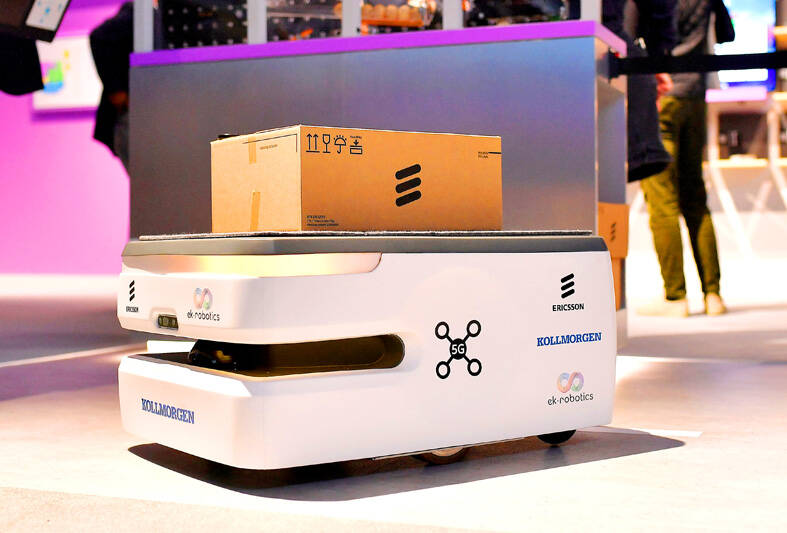Driverless vehicles, refrigerators that talk to toasters, breathtaking immersive reality, mind-blowing gaming experiences — 5G was going to enable it all, and telecoms were going to make a packet.
However, the reality is not so neat. The network that promised to be “not just another G” in Ericsson AB’s advertising has left many customers wondering what they are paying for.
Nonetheless, 5G was once again the central plank of the phone industry’s annual get-together, the MWC in Barcelona, Spain.

Photo: AFP
The event’s organizers proclaimed that 5G was “unlocking untapped value for all players across the entire ecosystem” and “redefining how the world connects.”
The hype came with a dose of reality from Orange SA chief executive officer Christel Heydemann.
Network operators were in peril, she told the MWC, because “massive network investments of almost 600 billion euros [US$640 billion] in Europe in the past decade happened to be hard to monetize.”
“And consumers expect to pay always less and get more,” she added.
Networks are not the only ones who might be rueing their big bet.
Ericsson, which supplies the equipment for 5G networks, has just laid off 8,500 people after profits slumped.
“5G has disappointed pretty much everybody — service providers and consumers, and it has failed to excite businesses,” Omdia research director Dario Talmesio said.
Talmesio said 5G was never really a consumer proposition, it was always more appropriate for businesses and industrial uses.
However, telecoms were unlikely to be seduced into investing billions only to improve connectivity in factories and ports, or help develop high-tech medical services.
Instead, they wrapped 5G in the kind of marketing that paints everything — even small improvements — as world-changing innovations.
Yet even now the benefits of 5G remain largely unclear to average smartphone users.
Thousands of US consumers told a survey last year that they were excited about the prospect of 5G, but when pressed, they had little idea what the benefits would be.
Most listed services that were already available with 4G, the survey of 10,000 US consumers by Israeli software company ironSource Ltd found.
This summarizes two of the main problems with 5G — 4G is good enough for most people, and 5G jargon is often impenetrable.
Terms like “low latency,” “network slicing,” “zero rating” and “massive IoT” are unlikely to get the pulse racing.
Despite its mass layoffs, Ericsson gave a huge floorspace at the MWC to 5G innovations, and insisted there would be no compromise on research and development.
“It is a platform for innovation. If you don’t do it, you don’t know what you miss out on,” Ericsson vice president Fredrik Jejdling said.
Frederique Liaigre, who runs Verizon Communications Inc’s business operation in France and other European countries, shares Jejdling’s enthusiasm, saying there was “no limit” to 5G’s potential.
Verizon was among the first to roll out 5G to customers in the US, and Liaigre concedes the business side is just getting started.
However, she regards her projects — such as providing a private 5G network to the port of Southampton in Britain to improve its security and supply chain management — as every bit as sexy as driverless vehicles or talking toasters.
“It’s really amazing the transformational capabilities of this technology,” she said.
Whether regular consumers will ever be so starry-eyed about 5G is up for debate.

South Korea’s equity benchmark yesterday crossed a new milestone just a month after surpassing the once-unthinkable 5,000 mark as surging global memory demand powers the country’s biggest chipmakers. The KOSPI advanced as much as 2.6 percent to a record 6,123, with Samsung Electronics Co and SK Hynix Inc each gaining more than 2 percent. With the benchmark now up 45 percent this year, South Korea’s stock market capitalization has also moved past France’s, following last month’s overtaking of Germany’s. Long overlooked by foreign funds, despite being undervalued, South Korean stocks have now emerged as clear winners in the global market. The so-called “artificial intelligence

NEW IDENTITY: Known for its software, India has expanded into hardware, with its semiconductor industry growing from US$38bn in 2023 to US$45bn to US$50bn India on Saturday inaugurated its first semiconductor assembly and test facility, a milestone in the government’s push to reduce dependence on foreign chipmakers and stake a claim in a sector dominated by China. Indian Prime Minister Narendra Modi opened US firm Micron Technology Inc’s semiconductor assembly, test and packaging unit in his home state of Gujarat, hailing the “dawn of a new era” for India’s technology ambitions. “When young Indians look back in the future, they will see this decade as the turning point in our tech future,” Modi told the event, which was broadcast on his YouTube channel. The plant would convert

‘SEISMIC SHIFT’: The researcher forecast there would be about 1.1 billion mobile shipments this year, down from 1.26 billion the prior year and erasing years of gains The global smartphone market is expected to contract 12.9 percent this year due to the unprecedented memorychip shortage, marking “a crisis like no other,” researcher International Data Corp (IDC) said. The new forecast, a dramatic revision down from earlier estimates, gives the latest accounting of the ongoing memory crunch that is affecting every corner of the electronics industry. The demand for advanced memory to power artificial intelligence (AI) tasks has drained global supply until well into next year and jeopardizes the business model of many smartphone makers. IDC forecast about 1.1 billion mobile shipments this year, down from 1.26 billion the prior

People stand in a Pokemon store in Tokyo on Thursday. One of the world highest-grossing franchises is celebrated its 30th anniversary yesterday.